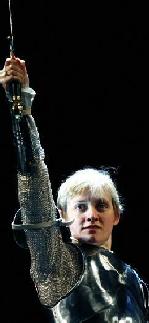SITE GUIDE
SEARCH
REVIEWS
FEATURES
NEWS
Etcetera and
Short Term Listings
LISTINGS
Broadway
Off-Broadway
NYC Restaurants
BOOKS and CDs
OTHER PLACES
Berkshires
London
California
New Jersey
DC
Philadelphia
Elsewhere
QUOTES
TKTS
PLAYWRIGHTS' ALBUMS
LETTERS TO EDITOR
FILM
LINKS
MISCELLANEOUS
Free Updates
Masthead
Writing for Us
A CurtainUp  London Review
London Review
 London Review
London ReviewSaint Joan
|
In my experience, the men who want something for nothing are invariably Christians.
---- The Earl of Warwick |

Anne-Marie Duff as Saint Joan
(Photo: Kevin Cummins) |
So why did the Catholic Saint Joan appeal to GBS as a subject? she is a rebel, a woman making her mark in a man's world. In her lifetime she was more a challenger to the hierarchy of the Catholic Church than the saint she became in the 1920s.
This production treats Saint Joan as a freedom fighter, someone the other side might call a terrorist. Shaw's original production had a man in modern dress appearing in the epilogue and being subject to derision by the medieval dressed people who had handed Joan over for trial. The point was then made that Joan was canonised as a saint in 1920. This point is lost in this production which has some modern dress in the fifteenth century.
Shaw writing about Saint Joan said, "If Joan had to be dealt with by us in London today, she would be treated with no more toleration . . . (than) any others who cross the line we have to draw, rightly or wrongly, between the tolerable and the intolerable." Anne-Marie Duff's opening scene with local lord of the manor Robert de Baudricourt (Brendan O'Hea) exactly captures that quirky nature, the sheer improbability of a country girl here to rescue the French monarchy and nobility out of the doldrums and lead them back into a war against the English that they will win. As she enters so do the whispers in the background. Duff seems kooky and direct but you find yourself thinking she had to be barking mad when you listen to what she says she has come to do. As Robert tries to put her off, she takes his head in her hands and tells him not to be afraid in a delicious gender role reversal.
Feminists celebrate Saint Joan as a woman who breaks away from a historically, traditional female role in a traditional not noble French family to that of a warrior, someone who fights like a man and dresses like a man and who thinks like a man. When she detects the heir to the French throne, the Dauphin (Paul Ready acting more than a little inbred) out of a crowd of courtiers we are impressed. The Dauphin bemoans his genetic inheritance saying of his grandfather Charles V called the Wise, "He was so wise he used up the whole family's stock of wisdom for five generations."
Marianne Elliott's opening scene is like a game of Jenga played with a pile of chairs which are slowly unpacked in slow motion to saintly music and tubular bells as the characters take their place. To the rear of the set is smoke and the impression of trees with jagged tunks, the aftermath of war.
The Orleans battle scenes are rhythmically choreographed with an impressively staged interpretation of warfare with drumming on metal, choral music and the waving of flags. The long trial scenes sees her charged with sorcery, wantonness and blasphemous pride, the ponderous Oliver Ford Davies playing the relentless Inquisitor. The staging of Joan's burning at the stake in Rouen is upsetting.
Paterson Joseph takes the role of Peter Cauchon, the Bishop of Beauvais his red outfit and forked beard making him look like a devil that he so fears. Shaw puts Joan and Catholicism in the context of the Protestant movement that will fledge 80 years after Joan's death. Angus Wright as the all powerful Englishman, the Earl of Warwick, has the task of working out how to scupper the French's new inspired military leader and his political arguments are full of wit. Together, Cauchon and Warwick debate how to be rid of Joan who threatens both the Church and the feudal power of the nibility. I liked too Christopher Colquhoun's noble bastard son of the Duc of Orleans, one of the few decent people on the French side. But this is Anne-Marie Duff's show. Her speeches of fervent nationalism express the French attitude to the English invasion. She lets out a heart wrenching cry at her trial when she thinks her voices have deserted her. Shaw makes the case for and against Joan with an evenhandedness that stops this being a heroine play but Anne-Marie Duff with her soft Irish accent and small frame with the boy's hair cut and infinite acting skill makes sure we sympathise with her.
|
SAINT JOAN
Written by George Bernard Shaw Directed by Marianne Elliott Starring: Anne-Marie Duff, Oliver Ford Davies, Paterson Joseph, Christopher Colquhoun, Angus Wright, Paul Ready With: Brendan O'Hea, Luke Treadaway, Ross Waiton, James Barriscale, James Hayes, Gareth Kennerley, Finn Caldwell, Michael Thomas, William Osborne, Simon Bubb, Jmie Ballard, Jonathan Jaynes, Michael Camp, Eke Chukwu, Simon Markey, David Ricardo-Pearce Design: Rae Smith Lighting: Paule Constable Music: Jocelyn Pook Sound: Paul Arditti Choreography: Hofesh Shechter Music Director: Harvey Brough Running time: Two hours 50 minutes with one interval Box Office: 020 7452 3000 Booking to 4th September 2007 Reviewed by Lizzie Loveridge based on 23rd July 2007 performance at the Olivier Theatre, Royal National Theatre, South Bank, London SE1 (Rail/Tube: Waterloo) |
|
London Theatre Tickets Lion King Tickets Billy Elliot Tickets Mary Poppins Tickets Mamma Mia Tickets We Will Rock You Tickets Theatre Tickets |




